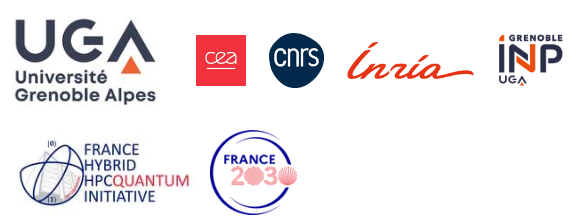
|
|
|
|
The machine learning tensor network workshop Topic of the workshop: Tensor network techniques are well-established numerical tools for solving seemingly exponentially hard problems in quantum many-body physics, with important successes in the simulation of model correlated electronic systems, quantum magnetisms and quantum computers. In this type of application, tensor networks are used to obtain compressed representations of quantum many-body wave functions, allowing for an exponential speed-up of otherwise impossible calculations. This workshop will gather important players in this emerging field, from both the applied mathematics and theoretical physics communities, to discuss these exciting new applications and algorithms. This workshop is inspired by activities within the tensor4all collaboration (https://tensor4all.org/). The schedule will be kept relatively light to leave much room for scientific discussions. Confirmed invited speakers: CHUNG Chia-Min, National Sun Yat-Sen University (Taïwan) ; JAKSCH Dieter, University of Hamburg (Germany) ; KAO Ying-Jer, National Taïwan University (Taïwan) ; KAUCH Anna, Vienna University of Technology (TU Wien, Austria) ; KAYE Jason, Flatiron Institute (USA) ; KHOO Yuehaw, University of Chicago (USA) ; LADO Jose, Aalto University (Finland) ; LINDSAY Michael J., University of California, Berkeley (USA) ; NUNEZ-FERNANDEZ Yuriel, Néel Institute, CNRS (France) ; OSELEDETS Ivan, Skolkovo Institute of Science and Technology (Russia) ; PARCOLLET Olivier, Flatiron Institute (USA) ; RITTER Marc, Ludwig Maximilian University of Munich (Germany) ; SAKURAI Rihito, University of Tokyo (Japan) ; SAVOSTYANOV Dmitry, University of Essex (UK) ; STOUDENMIRE Miles, Flatiron Institute ; WALLERBERGER Markus, Vienna University of Technology (TU Wien, Austria). How to log in and register? To access all pages of the website (registration, submissions...) you must be logged in with your siencesconf login. If you want to know how to log in and register, clink on the "How to log in and register" button on the left. Attending the workshop is free but subject to approval. There is a limited number of 50 attendees. Important dates: Registration and abstract submissions: up to June 30th Acceptance notification for both oral presentation and attendance: from June 30th to July 11th. UPTADE : extended to July 16th. The Workshop: from Monday October 6th, 9:00 am to Friday October 10th, 12:00 am Organized by:
Organizers Jan von Delft (Arnold Sommerfeld Center, Ludwig-Maximilians-Universität, Munich, Germany), Hiroshi Shinaoka (Saitama university, Japon) and Xavier Waintal (University Grenoble Alpes, Pheliqs CEA Grenoble, France) About the House of Quantum Alps: The House of Quantum Alps ran by the University Grenoble Alpes (UGA) as part of a consortium of actors involving CEA (Alternative and Atomic Energies Agency), CNRS (National Center for Scientific Research), Inria (National Institute for Research in Digital Science and Technology) and Grenoble INP - UGA (Grenoble Polytechnical Institute) is the initiative of the actors of the Auvergne Rhônes Alpes territory to respond to the challenges of quantum computing France 2030 implemented in the region from the Hybrid Quantum Initiative (HQI) program supported by the CEA. Its objective: to be a place of exchange and guide indutrials from all sectors on the possibilities of developing these approaches for theirs business applications. The House of Quantum Alps exists since April 1st 2025.
|








